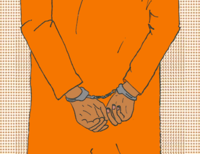Indiana, Oklahoma, and Arkansas undermine their own criminal justice reform agenda with challenge of FCC regulation of prison phone industry
Just what are governors who talk about the need for prison reform doing trying to stop the FCC's historic effort to protect the families of incarcerated people from exploitative prison phone companies?
by Emily Widra, March 14, 2016
As New York’s experience shows, lowering the price of phone calls home from prisons and jails has many benefits: it allows families to better stay in touch, reduces contraband cellphone use, and strengthens family relationships in preparation for when incarcerated people are released and return to their families and communities. That’s why New York State Department of Corrections and Community Supervision Commissioner, Anthony Annucci, called New York’s decision to reduce the rates of phone calls to less than five cents per minute “among the most cost-effective family reunification options that we offer.”
Last fall, the FCC followed the lead of states like New York and decided that families of incarcerated people nationwide should be able to benefit from reasonable phone rates. Unfortunately, some states are taking a penny-wise and pound-foolish approach and trying to block the FCC’s historic rate caps. First, the state of Oklahoma tried to join a group of phone companies in opposing the FCC prison phone rate caps. Then, eight additional states moved to join Oklahoma’s resistance to the rate caps: Arizona, Arkansas, Indiana, Kansas, Louisiana, Missouri, Wisconsin, and Nevada.
What’s shocking is that the governors of most of the states challenging the FCC are governors that have previously supported criminal justice reform in general and specifically, reducing recidivism and keeping families together. But by trying to block the FCC’s prison rate caps, these states are working to do the exact opposite: they are promoting policies that increase the financial and emotional burden that incarceration already imposes on families.
For example, in 2011, Oklahoma Governor Mary Fallin signed a bill into law that worked to allow people to serve their sentences closer to home by expanding community sentencing programs and electronic monitoring of people convicted of low-risk, nonviolent offenses. She has also spoken about the need for maintaining family connections when a parent is imprisoned in a correctional facility: “A child with a parent in prison is five times more likely to end up in the correctional system. We can do something about that. Many of our children who have a parent who’s in a correctional facility will grow up to live in poverty.” Making it possible for incarcerated parents to talk to their children for less than $1 per minute is one common-sense way of reinforcing these family ties.
The governors of Arkansas and Indiana have also explicitly expressed support for strengthening family ties and reducing recidivism rates, two goals that will be served by the FCC rate caps. Governor Asa Hutchinson of Arkansas, in his keynote address at the Charles Koch Institute’s Advancing Justice Summit, stated that his goal for criminal justice reform is to “give those who are re-entering society – the ex-offenders – a better second chance at a new life” by strengthening community connections.
Similarly, Indiana Governor Mike Pence has repeatedly advocated for a focus on rehabilitation: “first-time offenders ought to be dealt with in a way that’s focused on reformation, that’s focused on coming alongside these young men and giving them access to a full range of programs and individuals that will inspire them to be more and to make better choices in their lives.” Families are often the greatest source of inspiration and hope for people upon release. Governor Pence also emphasizes how high recidivism rates and prison time break apart families: “[recidivism is] tearing at the fabric of our neighborhoods, tearing at the fabric of our families, and that’s why I’ve been so committed … from the outset of this administration to drive new ideas and new innovations.”
As New York’s example shows us, FCC rate caps would surely make it easier for families to stay in touch. If the elected officials of these states are seeking to reduce recidivism and strengthen family and community ties, then why exactly are they opposing the FCC’s efforts to support these same goals?



